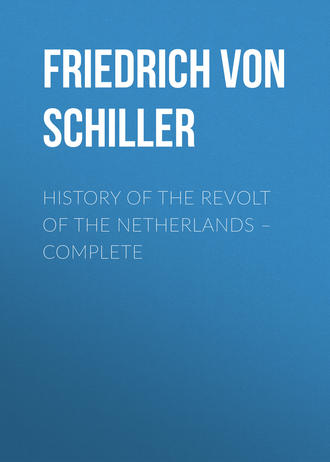 полная версия
полная версияHistory of the Revolt of the Netherlands – Complete
Philip received the new regent on the frontiers with a splendid cortege, and conducted her with magnificent pomp to Ghent, where the States General had been convoked. As he did not intend to return soon to the Netherlands, he desired, before he left them, to gratify the nation for once by holding a solemn Diet, and thus giving a solemn sanction and the force of law to his previous regulations. For the last time he showed himself to his Netherlandish people, whose destinies were from henceforth to be dispensed from a mysterious distance. To enhance the splendor of this solemn day, Philip invested eleven knights with the Order of the Golden Fleece, his sister being seated on a chair near himself, while he showed her to the nation as their future ruler. All the grievances of the people, touching the edicts, the Inquisition, the detention of the Spanish troops, the taxes, and the illegal introduction of foreigners into the offices and administration of the country were brought forward in this Diet, and were hotly discussed by both parties; some of them were skilfully evaded, or apparently removed, others arbitrarily repelled. As the king was unacquainted with the language of the country, he addressed the nation through the mouth of the Bishop of Arras, recounted to them with vain-glorious ostentation all the benefits of his government, assured them of his favor for the future, and once more recommended to the estates in the most earnest manner the preservation of the Catholic faith and the extirpation of heresy. The Spanish troops, he promised, should in a few months evacuate the Netherlands, if only they would allow him time to recover from the numerous burdens of the last war, in order that he might be enabled to collect the means for paying the arrears of these troops; the fundamental laws of the nation should remain inviolate, the imposts should not be grievously burdensome, and the Inquisition should administer its duties with justice and moderation. In the choice of a supreme Stadtholder, he added, he had especially consulted the wishes of the nation, and had decided for a native of the country, who had been brought up in their manners and customs, and was attached to them by a love to her native land. He exhorted them, therefore, to show their gratitude by honoring his choice, and obeying his sister, the duchess, as himself. Should, he concluded, unexpected obstacles oppose his return, he would send in his place his son, Prince Charles, who should reside in Brussels.
A few members of this assembly, more courageous than the rest, once more ventured on a final effort for liberty of conscience. Every people, they argued, ought to be treated according to their natural character, as every individual must in accordance to his bodily constitution. Thus, for example, the south may be considered happy under a certain degree of constraint which would press intolerably on the north. Never, they added, would the Flemings consent to a yoke under which, perhaps, the Spaniards bowed with patience, and rather than submit to it would they undergo any extremity if it was sought to force such a yoke upon them. This remonstrance was supported by some of the king’s counsellors, who strongly urged the policy of mitigating the rigor of religious edicts. But Philip remained inexorable. Better not reign at all, was his answer, than reign over heretics!
According to an arrangement already made by Charles V., three councils or chambers were added to the regent, to assist her in the administration of state affairs. As long as Philip was himself present in the Netherlands these courts had lost much of their power, and the functions of the first of them, the state council, were almost entirely suspended. Now that he quitted the reins of government, they recovered their former importance. In the state council, which was to deliberate upon war and peace, and security against external foes, sat the Bishop of Arras, the Prince of Orange, Count Egmont, the President of the Privy Council, Viglius Van Zuichem Van Aytta, and the Count of Barlaimont, President of the Chamber of Finance. All knights of the Golden Fleece, all privy counsellors and counsellors of finance, as also the members of the great senate at Malines, which had been subjected by Charles V. to the Privy Council in Brussels, had a seat and vote in the Council of State, if expressly invited by the regent. The management of the royal revenues and crown lands was vested in the Chamber of Finance, and the Privy Council was occupied with the administration of justice, and the civil regulation of the country, and issued all letters of grace and pardon. The governments of the provinces which had fallen vacant were either filled up afresh or the former governors were confirmed. Count Egmont received Flanders and Artois; the Prince of Orange, Holland, Zealand, Utrecht, and West Friesland; the Count of Aremberg, East Friesland, Overyssel, and Groningen; the Count of Mansfeld, Luxemburg; Barlaimont, Namur; the Marquis of Bergen, Hainault, Chateau-Cambray, and Valenciennes; the Baron of Montigny, Tournay and its dependencies. Other provinces were given to some who have less claim to our attention. Philip of Montmorency, Count of Hoorn, who had been succeeded by the Count of Megen in the government of Gueldres and Ziitphen, was confirmed as admiral of the Belgian navy. Every governor of a province was at the same time a knight of the Golden Fleece and member of the Council of State. Each had, in the province over which he presided, the command of the military force which protected it, the superintendence of the civil administration and the judicature; the governor of Flanders alone excepted, who was not allowed to interfere with the administration of justice. Brabant alone was placed under the immediate jurisdiction of the regent, who, according to custom, chose Brussels for her constant residence. The induction of the Prince of Orange into his governments was, properly speaking, an infraction of the constitution, since he was a foreigner; but several estates which he either himself possessed in the provinces, or managed as guardian of his son, his long residence in the country, and above all the unlimited confidence the nation reposed in him, gave him substantial claims in default of a real title of citizenship.
The military force of the Low Countries consisted, in its full complement, of three thousand horse. At present it did not much exceed two thousand, and was divided into fourteen squadrons, over which, besides the governors of the provinces, the Duke of Arschot, the Counts of Hoogstraten, Bossu, Roeux, and Brederode held the chief command. This cavalry, which was scattered through all the seventeen provinces, was only to be called out on sudden emergencies. Insufficient as it was for any great undertaking, it was, nevertheless, fully adequate for the maintenance of internal order. Its courage had been approved in former wars, and the fame of its valor was diffused through the whole of Europe. In addition to this cavalry it was also proposed to levy a body of infantry, but hitherto the states had refused their consent to it. Of foreign troops there were still some German regiments in the service, which were waiting for their pay. The four thousand Spaniards, respecting whom so many complaints had been made, were under two Spanish generals, Mendoza and Romero, and were in garrison in the frontier towns.
Among the Belgian nobles whom the king especially distinguished in these new appointments, the names of Count Egmont and William of Orange stand conspicuous. However inveterate his hatred was of both, and particularly of the latter, Philip nevertheless gave them these public marks of his favor, because his scheme of vengeance was not yet fully ripe, and the people were enthusiastic in their devotion to them. The estates of both were declared exempt from taxes, the most lucrative governments were entrusted to them, and by offering them the command of the Spaniards whom he left behind in the country the king flattered them with a confidence which he was very far from really reposing in them. But at the very time when he obliged the prince with these public marks of his esteem he privately inflicted the most cruel injury on him. Apprehensive lest an alliance with the powerful house of Lorraine might encourage this suspected vassal to bolder measures, he thwarted the negotiation for a marriage between him and a princess of that family, and crushed his hopes on the very eve of their accomplishment, – an injury which the prince never forgave. Nay, his hatred to the prince on one occasion even got completely the better of his natural dissimulation, and seduced him into a step in which we entirely lose sight of Philip II. When he was about to embark at Flushing, and the nobles of the country attended him to the shore, he so far forgot himself as roughly to accost the prince, and openly to accuse him of being the author of the Flemish troubles. The prince answered temperately that what had happened had been done by the provinces of their own suggestion and on legitimate grounds. No, said Philip, seizing his hated, and shaking it violently, not the provinces, but You! You! You! The prince stood mute with astonishment, and without waiting for the king’s embarkation, wished him a safe journey, and went back to the town.
Thus the enmity which William had long harbored in his breast against the oppressor of a free people was now rendered irreconcilable by private hatred; and this double incentive accelerated the great enterprise which tore from the Spanish crown seven of its brightest jewels.
Philip had greatly deviated from his true character in taking so gracious a leave of the Netherlands. The legal form of a diet, his promise to remove the Spaniards from the frontiers, the consideration of the popular wishes, which had led him to fill the most important offices of the country with the favorites of the people, and, finally, the sacrifice which he made to the constitution in withdrawing the Count of Feria from the council of state, were marks of condescension of which his magnanimity was never again guilty. But in fact he never stood in greater need of the good-will of the states, that with their aid he might, if possible, clear off the great burden of debt which was still attached to the Netherlands from the former war. He hoped, therefore, by propitiating them through smaller sacrifices to win approval of more important usurpations. He marked his departure with grace, for he knew in what hands he left them. The frightful scenes of death which he intended for this unhappy people were not to stain the splendor of majesty which, like the Godhead, marks its course only with beneficence; that terrible distinction was reserved for his representatives. The establishment of the council of state was, however, intended rather to flatter the vanity of the Belgian nobility than to impart to them any real influence. The historian Strada (who drew his information with regard to the regent from her own papers) has preserved a few articles of the secret instructions which the Spanish ministry gave her. Amongst other things it is there stated if she observed that the councils were divided by factions, or, what would be far worse, prepared by private conferences before the session, and in league with one another, then she was to prorogue all the chambers and dispose arbitrarily of the disputed articles in a more select council or committee. In this select committee, which was called the Consulta, sat the Archbishop of Arras, the President Viglius, and the Count of Barlaimont. She was to act in the same manner if emergent cases required a prompt decision. Had this arrangement not been the work of an arbitrary despotism it would perhaps have been justified by sound policy, and republican liberty itself might have tolerated it. In great assemblies where many private interests and passions co-operate, where a numerous audience presents so great a temptation to the vanity of the orator, and parties often assail one another with unmannerly warmth, a decree can seldom be passed with that sobriety and mature deliberation which, if the members are properly selected, a smaller body readily admits of. In a numerous body of men, too, there is, we must suppose, a greater number of limited than of enlightened intellects, who through their equal right of vote frequently turn the majority on the side of ignorance. A second maxim which the regent was especially to observe, was to select the very members of council who had voted against any decree to carry it into execution. By this means not only would the people be kept in ignorance of the originators of such a law, but the private quarrels also of the members would be restrained, and a greater freedom insured in voting in compliance with the wishes of the court.
In spite of all these precautions Philip would never have been able to leave the Netherlands with a quiet mind so long as he knew that the chief power in the council of state, and the obedience of the provinces, were in the hands of the suspected nobles. In order, therefore, to appease his fears from this quarter, and also at the same time to assure himself of the fidelity of the regent, be subjected her, and through her all the affairs of the judicature, to the higher control of the Bishop of Arras. In this single individual he possessed an adequate counterpoise to the most dreaded cabal. To him, as to an infallible oracle of majesty, the duchess was referred, and in him there watched a stern supervisor of her administration. Among all his contemporaries Granvella was the only one whom Philip II. appears to have excepted from his universal distrust; as long as he knew that this man was in Brussels he could sleep calmly in Segovia. He left the Netherlands in September, 1559, was saved from a storm which sank his fleet, and landed at Laredo in Biscay, and in his gloomy joy thanked the Deity who had preserved him by a detestable vow. In the hands of a priest and of a woman was placed the dangerous helm of the Netherlands; and the dastardly tyrant escaped in his oratory at Madrid the supplications, the complaints, and the curses of the people.
BOOK II.
CARDINAL GRANVELLA
ANTHONY PERENOT, Bishop of Arras, subsequently Archbishop of Malines, and Metropolitan of all the Netherlands, who, under the name of Cardinal Granvella, has been immortalized by the hatred of his contemporaries, was born in the year 1516, at Besancon in Burgundy. His father, Nicolaus Perenot, the son of a blacksmith, had risen by his own merits to be the private secretary of Margaret, Duchess of Savoy, at that time regent of the Netherlands. In this post he was noticed for his habits of business by Charles V., who took him into his own service and employed him in several important negotiations. For twenty years he was a member of the Emperor’s cabinet, and filled the offices of privy counsellor and keeper of the king’s seal, and shared in all the state secrets of that monarch. He acquired a large fortune. His honors, his influence, and his political knowledge were inherited by his son, Anthony Perenot, who in his early years gave proofs of the great capacity which subsequently opened to him so distinguished a career. Anthony had cultivated at several colleges the talents with which nature had so lavishly endowed him, and in some respects had an advantage over his father. He soon showed that his own abilities were sufficient to maintain the advantageous position which the merits of another had procured him. He was twenty-four years old when the Emperor sent him as his plenipotentiary to the ecclesiastical council of Trent, where he delivered the first specimen of that eloquence which in the sequel gave him so complete an ascendancy over two kings. Charles employed him in several difficult embassies, the duties of which he fulfilled to the satisfaction of his sovereign, and when finally that Emperor resigned the sceptre to his son he made that costly present complete by giving him a minister who could help him to wield it.
Granvella opened his new career at once with the greatest masterpiece of political genius, in passing so easily from the favor of such a father into equal consideration with such a son. And he soon proved himself deserving of it. At the secret negotiations of which the Duchess of Lorraine had, in 1558, been the medium between the French and Spanish ministers at Peronne, he planned, conjointly with the Cardinal of Lorraine, that conspiracy against the Protestants which was afterwards matured, but also betrayed, at Chateau-Cambray, where Perenot likewise assisted in effecting the so-called peace.
A deeply penetrating, comprehensive intellect, an unusual facility in conducting great and intricate affairs, and the most extensive learning, were wonderfully united in this man with persevering industry and never-wearying patience, while his enterprising genius was associated with thoughtful mechanical regularity. Day and night the state found him vigilant and collected; the most important and the most insignificant things were alike weighed by him with scrupulous attention. Not unfrequently he employed five secretaries at one time, dictating to them in different languages, of which he is said to have spoken seven. What his penetrating mind had slowly matured acquired in his lips both force and grace, and truth, set forth by his persuasive eloquence, irresistibly carried away all hearers. He was tempted by none of the passions which make slaves of most men. His integrity was incorruptible. With shrewd penetration he saw through the disposition of his master, and could read in his features his whole train of thought, and, as it were, the approaching form in the shadow which outran it. With an artifice rich in resources he came to the aid of Philip’s more inactive mind, formed into perfect thought his master’s crude ideas while they yet hung on his lips, and liberally allowed him the glory of the invention. Granvella understood the difficult and useful art of depreciating his own talents; of making his own genius the seeming slave of another; thus he ruled while he concealed his sway. In this manner only could Philip II. be governed. Content with a silent but real power, Granvella did not grasp insatiably at new and outward marks of it, which with lesser minds are ever the most coveted objects; but every new distinction seemed to sit upon him as easily as the oldest. No wonder if such extraordinary endowments had alone gained him the favor of his master; but a large and valuable treasure of political secrets and experiences, which the active life of Charles V. had accumulated, and had deposited in the mind of this man, made him indispensable to his successor. Self-sufficient as the latter was, and accustomeded to confide in his own understanding, his timid and crouching policy was fain to lean on a superior mind, and to aid its own irresolution not only by precedent but also by the influence and example of another. No political matter which concerned the royal interest, even when Philip himself was in the Netherlands, was decided without the intervention of Granvella; and when the king embarked for Spain he made the new regent the same valuable present of the minister which he himself had received from the Emperor, his father.
Common as it is for despotic princes to bestow unlimited confidence on the creatures whom they have raised from the dust, and of whose greatness they themselves are, in a measure, the creators, the present is no ordinary instance; pre-eminent must have been the qualities which could so far conquer the selfish reserve of such a character as Philip’s as to gain his confidence, nay, even to win him into familiarity. The slightest ebullition of the most allowable self-respect, which might have tempted him to assert, however slightly, his claim to any idea which the king had once ennobled as his own, would have cost him his whole influence. He might gratify without restraint the lowest passions of voluptuousness, of rapacity, and of revenge, but the only one in which he really took delight, the sweet consciousness of his own superiority and power, he was constrained carefully to conceal from the suspicious glance of the despot. He voluntarily disclaimed all the eminent qualities, which were already his own, in order, as it were, to receive them a second time from the generosity of the king. His happiness seemed to flow from no other source, no other person could have a claim upon his gratitude. The purple, which was sent to him from Rome, was not assumed until the royal permission reached him from Spain; by laying it down on the steps of the throne he appeared, in a measure, to receive it first from the hands of majesty. Less politic, Alva erected a trophy in Antwerp, and inscribed his own name under the victory, which he had won as the servant of the crown – but Alva carried with him to the grave the displeasure of his master. He had invaded with audacious hand the royal prerogative by drawing immediately at the fountain of immortality.
Three times Granvella changed his master, and three times he succeeded in rising to the highest favor. With the same facility with which he had guided the settled pride of an autocrat, and the sly egotism of a despot, he knew how to manage the delicate vanity of a woman. His business between himself and the regent, even when they were in the same house, was, for the most part, transacted by the medium of notes, a custom which draws its date from the times of Augustus and Tiberius. When the regent was in any perplexity these notes were interchanged from hour to hour. He probably adopted this expedient in the hope of eluding the watchful jealousy of the nobility, and concealing from them, in part at least, his influence over the regent. Perhaps, too, he also believed that by this means his advice would become more permanent; and, in case of need, this written testimony would be at hand to shield him from blame. But the vigilance of the nobles made this caution vain, and it was soon known in all the provinces that nothing was determined upon without the minister’s advice.
Granvella possessed all the qualities requisite for a perfect statesman in a monarchy governed by despotic principles, but was absolutely unqualified for republics which are governed by kings. Educated between the throne and the confessional, he knew of no other relation between man and man than that of rule and subjection; and the innate consciousness of his own superiority gave him a contempt for others. His policy wanted pliability, the only virtue which was here indispensable to its success. He was naturally overbearing and insolent, and the royal authority only gave arms to the natural impetuosity of his disposition and the imperiousness of his order. He veiled his own ambition beneath the interests of the crown, and made the breach between the nation and the king incurable, because it would render him indispensable to the latter. He revenged on the nobility the lowliness of his own origin; and, after the fashion of all those who have risen by their own merits, he valued the advantages of birth below those by which he had raised himself to distinction. The Protestants saw in him their most implacable foe; to his charge were laid all the burdens which oppressed the country, and they pressed the more heavily because they came from him. Nay, he was even accused of having brought back to severity the milder sentiments to which the urgent remonstrances of the provinces had at last disposed the monarch. The Netherlands execrated him as the most terrible enemy of their liberties, and the originator of all the misery which subsequently came upon them.
1559. Philip had evidently left the provinces too soon. The new measures of the government were still strange to the people, and could receive sanction and authority from his presence alone; the new machines which he had brought into play required to be kept in motion by a dreaded and powerful hand, and to have their first movements watched and regulated. He now exposed his minister to all the angry passions of the people, who no longer felt restrained by the fetters of the royal presence; and he delegated to the weak arm of a subject the execution of projects in which majesty itself, with all its powerful supports, might have failed.
The land, indeed, flourished; and a general prosperity appeared to testify to the blessings of the peace which had so lately been bestowed upon it. An external repose deceived the eye, for within raged all the elements of discord. If the foundations of religion totter in a country they totter not alone; the audacity which begins with things sacred ends with things profane. The successful attack upon the hierarchy had awakened a spirit of boldness, and a desire to assail authority in general, and to test laws as well as dogmas – duties as well as opinions. The fanatical boldness with which men had learned to discuss and decide upon the affairs of eternity might change its subject matter; the contempt for life and property which religious enthusiasm had taught could metamorphose timid citizens into foolhardy rebels. A female government of nearly forty years had given the nation room to assert their liberty; continual wars, of which the Netherlands had been the theatre, had introduced a license with them, and the right of the stronger had usurped the place of law and order. The provinces were filled with foreign adventurers and fugitives; generally men bound by no ties of country, family, or property, who had brought with them from their unhappy homes the seeds of insubordination and rebellion. The repeated spectacles of torture and of death had rudely burst the tenderer threads of moral feeling, and had given an unnatural harshness to the national character.









